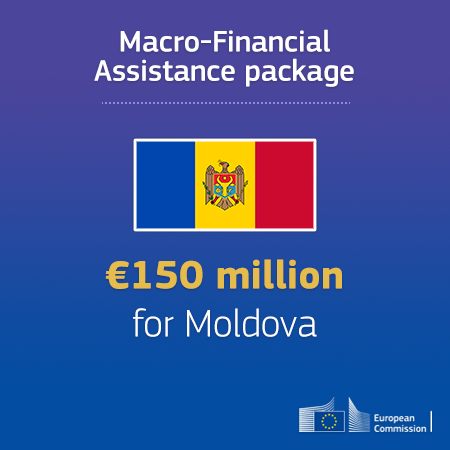
Following a request by the Republic of Moldova, the European Commission has adopted today a proposal for a new Macro-Financial Assistance (MFA) operation of up to €150 million, out of which up to €30 million would be provided in grants and up to €120 million in medium-term loans at favourable financing conditions.
Paolo Gentiloni, Commissioner for the Economy, said: “The European Commission continues to stand by the people of Moldova in these particularly challenging times. Alongside the new IMF programme, this proposed new Macro-Financial Assistance would provide both grants and loans at favourable rates to help support the Moldovan economy in the coming two years. As ever, this financing would be conditional on the fulfilment of policy commitments aimed at addressing some of the most pressing problems weighing on Moldova's economic development.”
The new MFA would build on the two previous MFA operations through which the EU has disbursed a total of €160 million to Moldova since 2017.
The Republic of Moldova continues to face many challenges, notably the need to tackle corruption and governance problems that have contributed to a weakening of the fiscal and balance of payments positions over the past several years, prompting support from international partners. The past year has been equally challenging for the country. Moldova has recently faced a significant energy crisis, which coupled with the post-pandemic recovery has further implications for the economic stability and outlook in Moldova going forward.
The proposed EU MFA, which requires adoption by the European Parliament and the Council before it can enter into force and disbursements can be made, would accompany the country's new IMF programme, approved on 20 December 2021. Specifically, the MFA would help Moldova to cover part of its external financing needs over the coming two years. The operation would thus contribute to reducing the economy's short-term balance-of-payments and fiscal vulnerabilities.
Disbursements under the proposed MFA would be strictly conditional on good progress with the IMF programme and on the implementation of specific policy conditionality to be agreed between Moldova and the EU in a Memorandum of Understanding. These policy conditions aim to address some of the fundamental weaknesses exposed in recent years in the Moldovan economy and economic governance system, and in other key areas, including good governance and fight against corruption, the rule of law, and energy security. The conditions will be in line with Moldova's commitments under the programme agreed with the IMF and World Bank as well as the EU budgetary support operations and the DCFTA agreement.
Background
MFA is part of the EU's wider engagement with neighbouring and enlargement partners and is intended as an exceptional crisis response instrument. It is available to enlargement and EU neighbourhood partners experiencing severe balance-of-payments problems. It demonstrates the EU's solidarity with these partners and the support of effective policies at a time of unprecedented crisis.
The MFA assistance is meant to complement a new programme, approved by the IMF Board on 20 December 2021, agreed between the Republic of Moldova and the International Monetary Fund (IMF).
The new assistance is to be disbursed in three instalments between 2022 and 2024.
EU-Moldova relations
The EU and the Republic of Moldova have developed a close political and economic relationship over the years, leading to conclusion of the Association Agreement (including the DCFTA), which was signed on 27 June 2014 and entered fully into force on 1 July 2016, and an Association Agenda that sets out the list of priorities for joint work.
The financial support to Moldova, including the MFA programme, is thus provided in accordance with the Association Agreement. In addition, the new MFA comes shortly after the release of €60 million grant of budget support in response to the energy crisis, and as part of the EU Economic Recovery and Resilience Plan for Moldova of up to €600 million for the next three years. In line with this plan and the Economic and Investment Plan for the Eastern Partnership, the EU will continue to support Moldova on its path to full economic recovery and further reform implementation.
For More Information
Details
- Publication date
- 4 January 2022
- Author
- Directorate-General for Neighbourhood and Enlargement Negotiations
